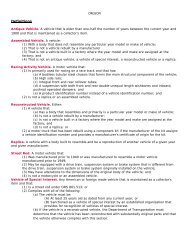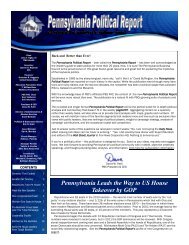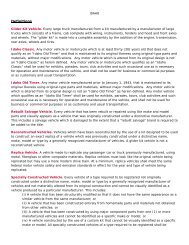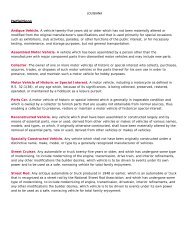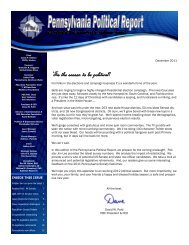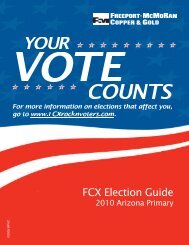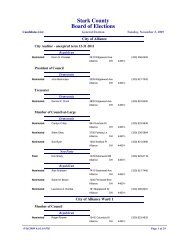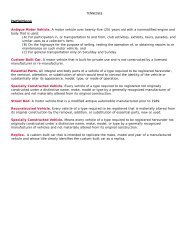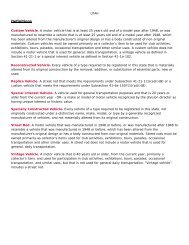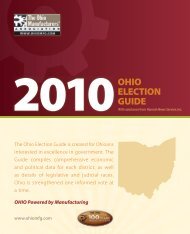keepingSCORE January 2012 - BIPAC
keepingSCORE January 2012 - BIPAC
keepingSCORE January 2012 - BIPAC
You also want an ePaper? Increase the reach of your titles
YUMPU automatically turns print PDFs into web optimized ePapers that Google loves.
Budget Energy Environment Health Care Infrastructure Labor Legal Tax Workforce<br />
DEFINING SUCCESS<br />
To be competitive, Pennsylvania businesses must be able to<br />
procure plentiful, reliable, and affordable energy. This requires<br />
the infrastructure and regulatory climate that fosters generation,<br />
transmission, and distribution systems throughout the<br />
Commonwealth. Specifics:<br />
Develop and exploit all energy sources and technologies allowing<br />
market forces to determine eventual ―winners and losers‖<br />
without government favoritism or sanction.<br />
Facilitate the development of Marcellus Shale natural gas<br />
reserves.<br />
Oppose severance tax until the industry is successfully rooted<br />
in the Commonwealth and then consider only in light of competitiveness<br />
with other states.<br />
GETTING IN THE GAME<br />
Call your state lawmakers. Tell them to pass legislation soon<br />
that provides certainty to Pennsylvania’s growing natural gas<br />
industry by setting standards, defining the role of municipal governments<br />
in drilling and industrial operations, and establishing<br />
the parameters of an impact fee. Click here to find the contact<br />
information for your state lawmakers.<br />
Marcellus Shale Impact Fee legislation has been voted in both the House and Senate and appears to be<br />
moving toward a consensus resolution between the two chambers. House Bill 1950, introduced by Rep.<br />
Brian Ellis (R-Butler), passed the House 107-76 with twenty members not voting. Likewise, SB 1100, introduced<br />
by Senate President Pro Tempore Joseph Scarnati (R-Jefferson), providing similar impact fee language,<br />
passed the Senate by a 29-20 vote in November. Both of these bills provide for the assessment of<br />
so-called impact fees which are intended to offset any adverse impacts resulting from drilling for natural<br />
gas in the Marcellus Shale gas fields which underlie a large portion of Pennsylvania. Both of these bills<br />
create a special fund within the General Fund and prohibit any impact fee revenues from being placed in<br />
the General Fund. The Pennsylvania Business Council, Pennsylvania Chamber and others in the business<br />
community have been working aggressively to ensure that any impact fee legislation is competitive with<br />
fees and taxes in other states, and provides a uniform regulatory framework for Marcellus Shale gas wells<br />
preventing individual municipalities from imposing their own ordinances and fees. Legislative leaders are<br />
working on a deal to take to a formally convened conference committee.<br />
House Bill 1294 was adopted by the House in October on a 184–17 vote and now awaits action in the<br />
Senate Consumer Protection and Professional Licensure Committee. This legislation would authorize the<br />
PUC to approve alternative ratemaking mechanisms for regulated utilities, including gas, electric, water,<br />
and wastewater utilities allowing them to begin to recover their capital investments in a more timely way<br />
and enable them to proceed with important Pennsylvania infrastructure improvement. These charges<br />
should be used to make distribution and collection systems that maintain and improve the reliability and<br />
safety of utility services, and that protect the environment of the Commonwealth. The Legislature provided<br />
a similar financing tool – known as a Distribution System Improvement Charge, or DSIC – to water companies<br />
in 1996 and it has been working well. Other states have followed this example and expanded the<br />
authorization for electric, gas, and wastewater infrastructure improvements. The legislation and the PUC<br />
would provide adequate safeguards for customers to just and reasonable rates. Alternative ratemaking<br />
would also protect customers from sudden rate spikes for infrastructure.<br />
The proposed XL Pipeline to transport crude oil from Canadian tar sands in northeastern Alberta to multiple<br />
distribution points in the United States has been halted by President Obama. The XL Pipeline is an extension<br />
of the Canadian Keystone pipeline which was proposed in 2005 by TransCanada Corporation and<br />
completed in 2010 after five years of delays. Construction of the Keystone XL pipeline is supposed to create<br />
at least 20,000 jobs in the US and is supposed to help make America less dependent on oil from the<br />
Middle East. The President blamed his decision on a requirement to reroute the pipeline because the original<br />
route would have passed through the environmentally sensitive Sand Hills of Nebraska. Policymakers in<br />
Nebraska report they would have been able to find an alternative route well before construction would<br />
have reached the state. TransCanada is now considering a route to Texas, rather than the Gulf Coast, that<br />
might not require Federal Government approval.<br />
Pennsylvania Business Council 116 Pine Street, Suite 201 Harrisburg, Pennsylvania 17101 717-232-8700 www.pabusinesscouncil.org






